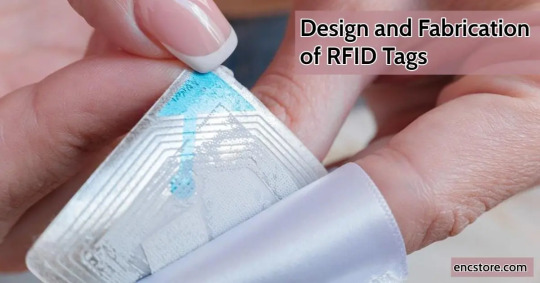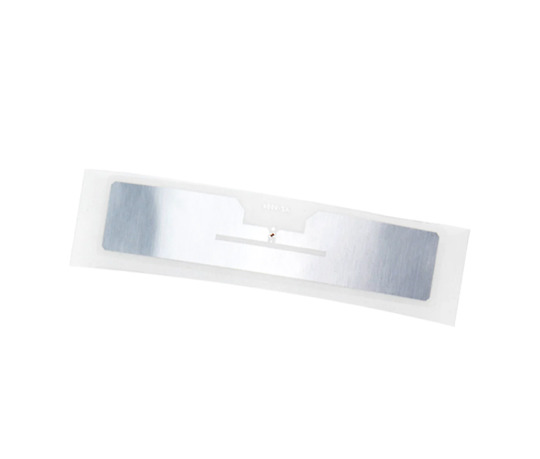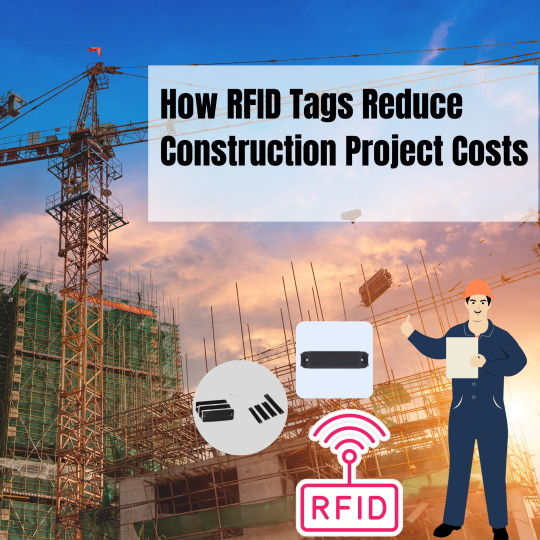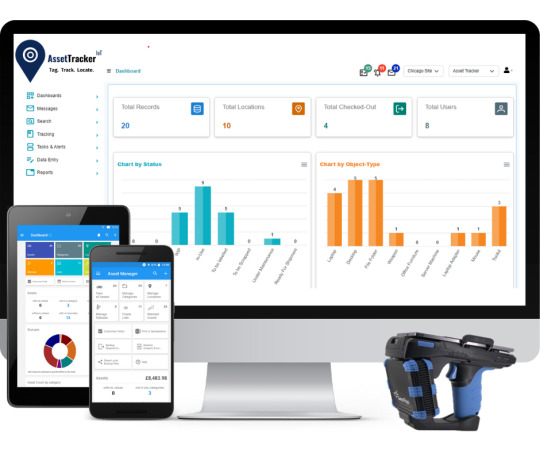#RFID asset Tags
Explore tagged Tumblr posts
Text
Every construction company faces the challenge of cutting costs without compromising efficiency. With tight budgets, project delays, and the constant risk of theft, staying on track can feel like an uphill battle. But what if there was a way to streamline operations, prevent losses, and keep your projects running like clockwork? That’s where RFID technology steps in. This advanced tracking solution has become a game-changer for the construction industry, helping companies stay within budget and improve how they manage their resources.
RFID technology is gaining rapid popularity due to its ability to solve some of the most persistent problems in construction. By Using RFID tags to track inventory in real time to reduce downtime caused by missing equipment, RFID brings precision and efficiency to construction site management. Implementing RFID technology allows for better coordination between workers and materials, reducing delays and minimizing errors. This not only helps to control costs but also keeps projects moving forward smoothly.
Our PCB RFID Tags are highly reliable, durable, with anti-counterfeit technology, and absolutely compatible with high temperatures comparatively. These are also known as smart PCBs with RFID tags. The working remains the same and can be easily deployed for all types of tracking. These tags are so small that they can be easily embedded with electronic equipment like Mobile Phones, LEDs, Computers, and other electronic devices that contain a PCB. Apart from this, these can also be used in consumer goods, medicines, straps and medical equipment, Metallic Molds, Hardware tools, etc. These tags have their own advantages as they need very low space on the PCB, can work easily without an antenna, and can also communicate without a line-of-sight connection possible.
If you have questions about any of our RFID Tags listed below please feel free to contact us.
#RFID Tags#RFID Technology#rfid solutions#Construction Sites#Inventory Management#Asset Tracking#High Temperature PCB Tags#RFID asset Tags#RFID Metal tags
0 notes
Text
Improve Asset Awareness with RFID over Manual Tracking

Manual asset tracking often leads to delays, errors, and poor visibility. RFID technology enables real-time asset location, status, and utilization, improving decision-making and reducing downtime. Transitioning to RFID brings measurable efficiency gains.
Read more: Improve Asset Awareness and RFID Technology Over Manual Tracking
0 notes
Text
Temperature Monitoring UHF Label - SIVA IoT
0 notes
Text
Total Visibility with Asset Tracking Tags
Trakaid is a leading provider of digital GPS asset tracking and monitoring solutions, specializing in industries like gas cylinders and cryogenic liquids. Their innovative system offers unparalleled control over assets, enabling businesses to meticulously track their journey from manufacturing to end-user consumption.
At the core of Trakaid's technology lies the use of asset tracking tags. Each asset is uniquely identified with a tamper-proof QR code and a UHF RFID tag. This two-pronged approach ensures accurate and secure identification. The data captured from these tags is then processed to provide real-time visibility into asset location, movement, and status.
By leveraging advanced asset tracking tags, Trakaid empowers businesses to optimize operations, minimize losses, and make data-driven decisions. From enhancing inventory management to preventing theft and improving customer service, the benefits are far-reaching. Visit Now: https://www.trakaid.com

0 notes
Text
Pre-printed RFID tags
Enhance your asset tracking with pre-printed RFID tags. Ready to use out of the box, these tags simplify your RFID setup, providing immediate tracking capabilities. Ideal for inventory management and asset tracking, our pre-printed RFID tags offer a seamless, efficient solution for businesses looking to optimize their operations.
1 note
·
View note
Text
MACO INFOTECH - Fixed Asset Management & Tracking Software
A user friendly fixed asset management software that enables Asset Management & Tracking, Physical Audit & Verification, Depreciation Calculation, Service & Maintenance etc. with RFID, ERP and AD integration.

0 notes
Text

Trust ID Tech Solution as Your Reliable RFID Tags Supplier
When it comes to RFID tags, reliability is key. At ID Tech Solution, we take pride in being your trusted supplier of top-quality RFID tags. With years of experience and a commitment to excellence, we provide RFID tags that meet the highest standards of quality and performance. Whether you need RFID tags for inventory management, asset tracking, or any other application, you can count on ID Tech Solution to deliver the perfect solution for your needs.
#rfid tags#rfid tags for inventory#rfid tags for asset tracking#rfid tags supplier#active rfid tags#rfid tag for inventory management
0 notes
Text
How are RFID tags manufactured?
RFID (radio frequency identification) tags are sophisticated little devices composed of an integrated circuit or microchip, an antenna, and a substrate material holding it all together.
The manufacturing process starts with the specialized microchip at the heart of the RFID tag. These tiny chips with their logic units and memory are designed and mass-produced by leading semiconductor manufacturers on large silicon wafers using advanced processes. The latest chips boast 40,000 to 50,000 transistors!
In parallel, the tag antenna - often made from thin copper, aluminum or conductiveinks - is precisely designed and manufactured to operate at specific radio frequencies. Antennas are deposited onto a substrate material like plastic or polymer selected for properties like flexibility and environmental resistance.
Once the chip and antenna components are ready, they are married together on the substrate to create an "inlay" - the core RFID module. At this stage, inlays look like a simple sticker strip on a reel.
The inlays then get converted into finished "smart labels" by companies like EnCStore. This conversion process can involve printing human-readable text and barcodes, adding adhesive backing layers, and even encasing the inlay in a ruggedized case for harsh environments.
What sets some RFID tag suppliers apart is their ability to manufacture tags in-house. One such company is EnCStore, the best RFID tag manufacturer in India. By manufacturing their own inlays in-house, innovative companies like EnCStore have enabled greater quality control and cost efficiencies - allowing them to offer competitive RFID tag prices. Their smart manufacturing approach brings affordable RFID solutions within reach of more businesses and applications.

0 notes
Text

AIDC technologies are revolutionizing the field by tackling the enduring problem of human fallibility in spite of computers' rapid data processing speed. According to studies, people make mistakes in 1 out of every 300 entries. These mistakes can have serious repercussions, including lost time, money lost, reputational damage, and even potentially fatal circumstances.
0 notes
Text
RFID Tags: Revolutionizing Identification and Tracking

In today's fast-paced world, efficiency and accuracy are paramount. Radio Frequency Identification (RFID) tags have emerged as a game-changing technology, offering a streamlined and reliable solution for identification and tracking across a wide range of industries. These tiny tags, embedded with microchips and antennas, can store and transmit data wirelessly, enabling seamless tracking of assets, inventory, and personnel.
The Significance of RFID Tags
RFID tags have revolutionized various sectors due to their unique advantages:
Enhanced Efficiency: RFID tags eliminate the need for manual scanning or barcode reading, significantly reducing time and labor costs.
Improved Accuracy: RFID tags provide error-free identification, eliminating the potential for human error often associated with manual data entry.
Real-time Tracking: RFID tags allow for real-time tracking of assets, enabling businesses to monitor their inventory and optimize their supply chain.
Versatility: RFID tags can be attached to a wide range of objects, from clothing and electronics to livestock and vehicles, making them a versatile solution for various applications.
A World of Applications
RFID tags have permeated various industries, transforming operations and enhancing efficiency. Here are some notable examples:
Supply Chain Management: RFID tags streamline inventory management, enabling real-time tracking of goods throughout the supply chain, from manufacturing to distribution.
Access Control: RFID tags enable secure access control systems, granting authorized personnel access to restricted areas or buildings.
Asset Tracking: RFID tags are widely used to track valuable assets, such as medical equipment, library books, and industrial tools, preventing theft and loss.
Animal Tracking: RFID tags are employed for animal identification and tracking, providing valuable insights into livestock management, wildlife conservation, and research.
Retail: RFID tags enhance retail operations, enabling efficient inventory management, loss prevention, and personalized customer experiences.
SB Components: Your One-Stop Shop for RFID Tags
SB Components is a leading provider of high-quality RFID tags, catering to the diverse needs of businesses and individuals. Our extensive range of RFID tags includes a variety of frequencies, sizes, and functionalities to suit specific applications.
Whether you're looking to track inventory, manage access control, or enhance customer experiences, SB Components has the RFID tags that meet your requirements. Our expert team is always ready to assist you in selecting the right RFID tags for your unique needs.
Embrace the Future with RFID Technology
RFID tags have revolutionized identification and tracking, offering a powerful and versatile solution for businesses and individuals alike. As technology continues to advance, RFID tags are poised to play an even more significant role in streamlining operations, enhancing efficiency, and improving decision-making across industries.
To explore the vast potential of RFID tags, visit SB Components today and discover the innovative solutions that await you.
#rfid tags#rfid chip#rfid sticker#rfid nfc#rfid labels#rfid in iot#tag reader#rfid tag reader#rfid tag for car#rfid tag price#active rfid#rfid asset tracking#passive rfid tags#rfid tags for inventory#rfid decathlon#active rfid tag
0 notes
Text
RFID Tags for Metal: Your Key to Asset Efficiency

Streamline tracking in metal-rich environments with Anti-Metal RFID Tags. Engineered for reliable performance near metal surfaces, these specialized tags ensure accurate asset and inventory management. Trust DBS Cards for top-quality RFID solutions with two decades of industry experience.
0 notes
Text
How RFID Tags Reduce Construction Project Costs

Every construction company faces the challenge of cutting costs without compromising efficiency. With tight budgets, project delays, and the constant risk of theft, staying on track can feel like an uphill battle. But what if there was a way to streamline operations, prevent losses, and keep your projects running like clockwork? That’s where RFID technology steps in. This advanced tracking solution has become a game-changer for the construction industry, helping companies stay within budget and improve how they manage their resources.
RFID technology is gaining rapid popularity due to its ability to solve some of the most persistent problems in construction. By Using RFID tags to track inventory in real time to reduce downtime caused by missing equipment, RFID brings precision and efficiency to construction site management. Implementing RFID technology allows for better coordination between workers and materials, reducing delays and minimizing errors. This not only helps to control costs but also keeps projects moving forward smoothly.
What is RFID Technology?
Radio Frequency Identification (RFID) technology is a system that uses electromagnetic fields to track and manage assets. RFID tags, which consist of a small chip and antenna, can be attached to tools, equipment, materials, and even employee badges. Unlike barcodes that require direct scanning, RFID tags can be read from a distance, without a line of sight. This makes gathering and tracking real-time data across a construction site easy.
From managing inventory to tracking workforce movements, RFID tags provide instant insights, allowing project managers to make better decisions. This technology is particularly useful in large construction projects where manual tracking becomes inefficient and costly.
How RFID Tags Reduce Construction Project Costs
RFID technology offers several ways to cut costs, which can make a big difference in managing a construction project efficiently. Let’s explore how RFID technology tackles some of the biggest cost-related challenges in the industry.
1. Reducing Theft
Construction site theft poses a significant problem that can substantially inflate costs. Losing expensive equipment or materials not only causes delays but also eats into the project’s budget. With an estimated annual loss between $300 million to $1 billion from theft, companies need a reliable way to protect their assets.
High Temperature RFID tags provide a layer of security that traditional methods lack. By tagging high-value tools, machinery, and building materials, construction companies can track these assets in real time. If something is moved outside a designated area, an alert is triggered, allowing immediate action to be taken. The ability to monitor equipment 24/7 not only reduces the risk of theft but also helps recover stolen items.
With RFID, companies can avoid expensive replacements and reduce insurance costs, ultimately saving significant amounts of money on projects.
2. Improving Time Management
In construction, time is money. Delays, miscommunication, and inefficiencies often lead to extra costs, especially when workers or materials aren’t where they need to be. Traditional methods of tracking labor and materials can be time-consuming and prone to human error, which can slow down projects and increase costs.
RFID technology provides real-time visibility into every aspect of a construction site. RFID tags attached to employee badges allow project managers to monitor worker attendance and location across the site. This ensures that labor is used efficiently, and workers are being paid for the exact hours they’re on the job. It also helps in tracking equipment usage, preventing any delays caused by missing tools or machinery.
Furthermore, RFID systems automate the process of tracking deliveries and inventory. This ensures that materials are delivered on time and kept in the right place, avoiding any delays or extra costs due to missing supplies. With RFID, construction managers can optimize daily operations, preventing time from slipping away and cutting down on unnecessary expenses.
3. Optimizing Resource Allocation
Efficient resource allocation is essential to keeping construction projects on budget. However, without accurate information on inventory and equipment, companies often end up over-ordering materials or renting additional machinery, leading to wasteful spending.
RFID technology offers an ideal solution for this. By providing real-time data on inventory levels, construction managers can make informed decisions about ordering materials. For example, if a certain type of building material is running low, an RFID system will send an alert before stocks are depleted. This ensures timely reordering and prevents overstocking, which reduces waste and lowers costs.
RFID tags can also track the usage of heavy machinery. If equipment is sitting idle for long periods, it might be better allocated to another site or rented out. By keeping a close eye on resource usage, construction companies can avoid the costs of renting extra machinery unnecessarily and optimize their existing assets.
The Long-Term Benefits of RFID in Construction
RFID technology doesn’t just provide immediate cost savings. It also delivers long-term benefits that can help construction companies stay competitive in the future. By improving overall site efficiency, companies can complete projects faster, minimize errors, and avoid the need for costly rework.
Beyond reducing costs, RFID systems can also help improve safety, ensure regulatory compliance, and offer better transparency throughout the supply chain. These advantages not only lead to lower costs but also contribute to better overall project outcomes.
Conclusion
RFID technology is revolutionizing the construction industry by offering practical solutions to some of the biggest cost challenges. From reducing theft to improving time management and optimizing resource allocation, RFID tags are making construction projects more efficient and cost-effective.
For companies looking to cut expenses without sacrificing quality, adopting RFID technology is a strategic move that offers both short-term savings and long-term advantages. As construction projects become more complex, RFID systems will continue to play a vital role in helping businesses stay on track and within budget.
#rfid technology#rfid solutions#rfid tags#rfid tags manufacturers#construction company#Inventory Management#High Temperature PCB Tags#RFID asset Tags#RFID Metal tags
0 notes
Text
Asset Management with AssetTrackerIoT: Automation, Maintenance, and Tracking

AssetTrackerIoT tracks industrial assets and equipment, ensuring timely inspections, calibrations, and maintenance. It automates inspections with checklists and stores data in audit records. Maintenance software identifies events, including asset details, dates, times, workers, parts used, and final status.
Visit AssetTrackerIoT for more.
#assetmanagement#rfid technology#rfid#asset tracking#tracking software#rfid tags#assets#office asset tracking
0 notes
Text
UHF Anti-metal Labels
0 notes
Text
Physical Verification of Fixed Assets by MASLLP: Ensuring Accuracy and Accountability
For businesses, maintaining an accurate record of fixed assets is crucial for financial reporting, compliance, and operational efficiency. MASLLP, a trusted name in the financial consulting domain, offers expert services for the physical verification of fixed assets, ensuring your business stays organized, compliant, and secure.
What is Physical Verification of Fixed Assets? Physical verification of fixed assets involves systematically checking and validating the existence, condition, and location of assets owned by a business. It is a critical process to:
Identify discrepancies between physical assets and records. Ensure compliance with accounting standards and regulations. Protect against theft, loss, or mismanagement of assets. Why Choose MASLLP for Fixed Asset Verification? MASLLP’s team of experienced professionals ensures a seamless and accurate verification process. Here’s why businesses trust MASLLP:
Comprehensive Asset Audits MASLLP’s experts conduct thorough physical inspections, cross-referencing assets with financial records to identify inconsistencies.
Advanced Tools and Technology Using cutting-edge tools like barcoding, RFID, and asset tracking software, MASLLP ensures precision in the verification process.
Customized Solutions Every business is unique, and MASLLP tailors its asset verification services to align with your organization’s specific needs and objectives.
Compliance Expertise With MASLLP’s expertise in financial regulations, your business stays compliant with statutory requirements and accounting standards.
Key Benefits of Physical Verification by MASLLP Accurate Financial Reporting Eliminate discrepancies in your financial statements by ensuring all assets are accounted for.
Enhanced Asset Management Identify underutilized, misplaced, or obsolete assets to improve efficiency and cost-effectiveness.
Risk Mitigation Reduce the risk of theft, fraud, or mismanagement by maintaining an accurate and up-to-date asset register.
Regulatory Compliance Ensure adherence to legal and accounting standards, avoiding penalties and audits.
MASLLP’s Fixed Asset Verification Process
Planning and Preparation Understanding the client’s asset management system. Defining the scope of the verification process.
On-Site Physical Verification Conducting a detailed inspection of assets. Tagging and labeling assets where required.
Reconciliation Comparing physical records with the asset register. Identifying and addressing any discrepancies.
Reporting Providing a comprehensive report with findings and recommendations. Why Regular Fixed Asset Verification is Essential Businesses often overlook the importance of regular physical verification, which can lead to:
Inaccurate asset valuation. Missed opportunities for tax benefits. Increased risks of fraud or theft. By partnering with MASLLP, businesses can maintain a robust asset management system and safeguard their investments.
Get in Touch Ensure your fixed assets are accounted for and secure with MASLLP’s Physical Verification of Fixed Assets services.
#accounting & bookkeeping services in india#audit#businessregistration#chartered accountant#foreign companies registration in india#income tax#taxation#ap management services#auditor
5 notes
·
View notes
Text

How Seleam Helps Enterprises
Seleam, as a robust fixed assets management system, provides several features and benefits that help enterprises manage their assets effectively:
Centralized Database:
Unified Platform: Maintain all asset information in a single, centralized database accessible to authorized personnel.
Data Integration: Integrate with other enterprise systems (e.g., ERP, accounting software) for seamless data flow.
Advanced Tracking and Monitoring:
Real-Time Tracking: Use barcodes, RFID tags, or IoT sensors for real-time asset tracking.
Condition Monitoring: Continuously monitor the condition of assets to predict failures and plan maintenance.
Automated Processes:
Workflow Automation: Automate routine tasks such as asset check-ins/outs, maintenance scheduling, and depreciation calculations.
Notifications and Alerts: Set up alerts for maintenance due dates, warranty expirations, and compliance deadlines.
Comprehensive Reporting and Analytics:
Customizable Reports: Generate detailed reports on asset utilization, maintenance history, financials, and more.
Data Analytics: Use analytics tools to gain insights into asset performance and make data-driven decisions.
User-Friendly Interface:
Intuitive Dashboard: Provide an easy-to-use dashboard for quick access to key information and metrics.
Mobile Access: Enable remote access through mobile devices for on-the-go asset management.
Scalability and Flexibility:
Scalable Solution: Adapt to the growing needs of the enterprise, whether it's adding more assets or expanding to new locations.
Customization: Offer customizable features to meet the specific requirements of different industries and organizations.
2 notes
·
View notes